
Massive protests have erupted in Israel, with about 500,000 people marching in Tel Aviv Sunday to demand an end to the war in Gaza. Organizers say 1 million took part in demonstrations across the entire country. Most of the Israelis who were out on the streets “blame Netanyahu” for prioritizing his political survival over an end to the war, says Oren Ziv, reporter and photographer for +972 Magazine. Ziv notes that most Israelis are “not speaking directly on the suffering in Gaza, on the killings, on the children, on the starvation,” but instead focus on the survival of the hostages held in Gaza.
Transcript
AMY GOODMAN: This is Democracy Now!, democracynow.org, The War and Peace Report. I’m Amy Goodman.
We turn now to Israel, where over 500,000 people protested in Tel Aviv Sunday to demand an end to the war in Gaza and for the Israeli government to reach a deal to free the hostages in Gaza. Over a million people took part in protests across Israel as the families of Israeli hostages called for a nationwide day of stoppage. This is Lishay Miran-Lavi, the wife of Omri Miran, who’s being held in Gaza.
LISHAY MIRAN-LAVI: Last week, we decided to call to everyone in Israel, to all the citizens, to stop, take a day and stop all the country, in one saying: Please release the hostages, bring them home, and stop the war. We are really caring about our dears that’s over there. My Omri is over there 681 days. I miss him. Our daughters, Roni and Alma, really miss him, and I’m really, really scared and afraid about his life. I want him here, and I want all the hostages here.
AMY GOODMAN: Israeli Prime Minister Benjamin Netanyahu blasted the protesters, saying, quote, “Those who call to end the war delay the hostages’ release and guarantee that the horrors of October 7 will return,” unquote.
For more, we go to Oren Ziv, reporter and photographer for +972 Magazine and the independent Israeli news site Local Call.
Oren, welcome back to Democracy Now! You were covering the protests. Can you talk about the significance of the size of these protests, and what exactly the Israelis were calling for?
OREN ZIV: Thank you for having me.
I think it’s a really interesting moment, because over the past almost two years, we’ve seen big protests, but not huge like that. And we’ve seen also moments during the war with Iran, with Lebanon and other occasions that the numbers were really low. People — you know, Netanyahu is doing what he’s doing the best, and he’s dragging time and making people tired. And this is also true to the Israeli public, that went in tens of thousands in the last year and a half or two years. But yesterday, a big and a significant number of people went out.
And it’s even more important with the incitement we’ve seen from Netanyahu and other ministers that were even more harsh than Netanyahu, saying that protesters are helping Hamas, making the price of a deal higher, and so on. So, in the fact of in the end of this day — during the day, there were hundreds, if not thousands, small vigil, direct action roadblocks. The country was shut down, basically, traffic-wise. And in the evening, we saw one of the biggest vigils and demonstration we’ve seen in recent years, of almost half a million people in the streets in Tel Aviv. And this is, first and for all, a message from the Israeli public, and what the polls show, that the vast majority of the Israeli public is willing to end the war in order to release the hostages.
Now, it’s important to say that this is from an internal Israeli perspective. It’s not like the protests we see abroad. These are people who are calling to return the hostages in any price. And after two years, many of them, many in the Israeli public, blame Netanyahu. He’s trying to blame Hamas. But many of the people, or the most of the people who went out yesterday to the streets, are blaming Netanyahu for not doing a deal, to survive politically. This is a very common statement you hear from everyone on the streets. And they’re calling to end the war. They’ve seen in the last two years that only political agreements and ceasefire agreements bring back hostages alive. We’ve seen over 40 hostages that died in captivity, either from the army’s attack or from reaction of Hamas when they were trying to — when the army was coming nearby. And people had enough.
In the same time, it’s important to say that the vast majority of the protesters yesterday, although the fact they called to end the war, they’re not speaking directly on the suffering in Gaza, on the killings, on the children, on the starvation. You can hear it here and there. You can hear it from smaller groups that have been protesting from the beginning of the war against the genocide and the ongoing ethnic cleansing. But it’s not on the stages. It’s not the main message yet.
AMY GOODMAN: I wanted to get your response to how Israelis have responded to Israel’s Channel 12 airing those leaked recordings of Israel’s former military intelligence chief saying 50 Palestinians must die for every victim of October 7th, saying tens of thousands of Palestinians must die. In the recording, Aharon Haliva is heard saying, quote, “It does not matter now if they are children.” He said, quote, “They need a Nakba every now and then to feel the price.” Oren Ziv?
OREN ZIV: So, to be honest, the vast majority of the discussion inside Israel was regarding the fact that this person, that many Israelis see as the responsible for the catastrophe of October 7th, for the failure of the Israel intelligence to finding out that this will happen, so people thought this kind of leaked recordings — some people say that he might have leaked it out — are kind of serving him, to clean him and to blame the problem is the general system. So, in Israel, the vast majority of discussion was about that. Was it really leaked? Is it serving him? Why? You know, many people, hostages — family members of hostages are saying he should be trialed and sit in prison.
But this segment didn’t catch a lot of attention in Israel, because, unfortunately, this is very common. It’s something we heard from day one from politicians, from army people, in the public, in the — in right-wing demos, we hear it. We hear it everywhere. So, unfortunately, this didn’t cause a lot of noise in Israel.
But definitely, it shows you that such a high commander saying these things openly, you know, without being ashamed and without getting any attention in Israel, show you that this decision of revenge, of genocidal war, was done from day one. And Israel, also to cover the failure of October 7, decided to go to a revenge, a horrific war, as we’re seeing now. And you can see that this decision is not just by soldiers on the ground or right-wing or extreme so-called settlers. This is all across the army, from the high-ranked commanders and the politicians to the simple soldiers. And now when we see the horrific reality in Gaza after almost two years, we can understand this was planned. The army felt they have to revenge to cover up the failure of October 7.
AMY GOODMAN: I also wanted to ask you about the Israelis who are refusing to enlist in the Israeli military. You just posted a short video of 19-year-old Yona Roseman, who was sentenced to 30 days in military prison.
YONA ROSEMAN: Today, I’m going to show up at a draft office and declare that I refuse to serve in an army that’s committing genocide. And for that, I will probably be sent to military jail.
AMY GOODMAN: That’s Yona Roseman. How common is this, the refuseniks?
OREN ZIV: So, it’s not very common, especially in mandatory service. Eighteen-year-old students, high school students are all the system, all their life — all the education system is pushing them to go to the army. That’s the norm. In order to be like Yona and other brave young Israelis, you have to go against the stream and to educate yourself and to go to demonstration and meet people and not watch the Israeli mainstream media, who doesn’t show you what’s going on in Gaza and the West Bank. And so, it’s not very common.
But we’ve seen some increase in the number. Already from the beginning of the war, more than 12 announced, ones who went public, a youth who refused. And they pay a price. It’s not only 30 days in prison. They have to go again and again to prison a few times. But among reservists, we’ve seen — reservists, we’ve seen a growing movement of people refusing, because of what’s been happening in Gaza, also calling to release the hostages. And we’ve seen hundreds of people refuse. With some of them, the army chooses not to deal with prison, but to release them quietly.
Specifically about Yona and her group from Mesarvot — “refusing” in Hebrew — they are showing — they want to show that not everybody in Israel, that there is a small group who resists the genocide and the horrific things the army does. And as she told us, that’s her duty. That’s the only thing you can do when you see what the army is doing. She told me in the interview before she went to prison that she decided even before October 7 and before the war in Gaza to refuse, but after the genocide started, it was much easier for her to take this decision. And we hear it from other refuseniks, as well.
And, you know, it’s very hard. When she appears on social media, on national media, they get a lot of incitement, hatred, inside the prison and also when they go out. Last month, they burned some of the enlistment orders in the streets in Tel Aviv. And to do something like that in the general atmosphere in Israel, that is very hostile to this action, is very, very brave.
AMY GOODMAN: I finally wanted to ask you, as you cover protests, yes, the protests this weekend of a million Israelis, but also about the protest outside the hotel where GHF staff were staying in Tel Aviv. That’s the so-called Gaza Humanitarian Foundation, this shadowy U.S.-backed Israeli company that is supposedly providing food aid, but when people come, they are often shot dead as they try to seek food, children and adults alike. What about that protest?
OREN ZIV: So last week, a group of activists, radical left-wing activists, located where the so-called GHF staff, including CEO and other senior members, are staying in Tel Aviv, because, you know, they work in Gaza in coordination with the Israeli army and other companies, but they’re staying in a very fancy hotel in the shore of Tel Aviv. And they wanted to come there to send a clear message that this is not accepted, that they’re not welcome here, and to stop this lie that is called the Gaza Humanitarian Fund. So, they came there, around 50 protesters, to surprise. The police was not aware of it. They arrived there to the entrance of the hotel, we know from people inside. They heard them inside the hotel. And they were protesting there for about an hour. The police was trying to push them away.
Some tourists and people who passed by tried to confront them. And this happens, by the way, in every demo like this, against the genocide, against the starvation, in Tel Aviv and other cities, that are often attacked by the Israeli public. The Israeli mainstream media doesn’t show the images or the voices from Gaza like you do and many other media outlets. So, when the Israeli public is met on the streets with people who are trying just to show the facts, to shed light on what’s happening on the other side of the fence, people are many times surprised or even angry and try to attack the protesters. And they are telling me this is only one of first actions they will do against the GHF operation here in the region.
AMY GOODMAN: Oren Ziv, we want to thank you for being with us, reporter and photographer for +972 Magazine and the independent Israeli news site Local Call.
When we come back, we go to Annette Gordon-Reed, president of the Organization of American Historians. President Trump has ordered a review of how U.S. history is told in Smithsonian museums. We’ll also look at a curriculum that is being adopted by at least 10 states, that’s put out by PragerU. Among the videos children are shown is an animated Christopher Columbus talking about why, well, slavery was better than death. Back in a minute
[break]
AMY GOODMAN: “Black Waters,” performed by Nora Brown and Stephanie Coleman in our Democracy Now! studio. They joined us in March to talk about their recent appearance at the Kennedy Center, where they unfurled banners to protest President Trump’s takeover of the famed cultural institution.

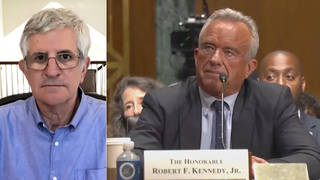
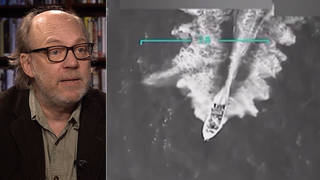
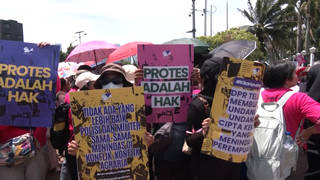
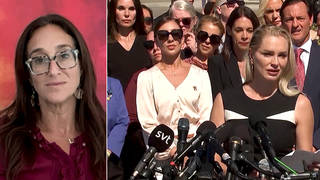





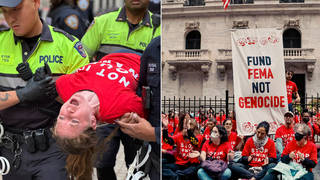
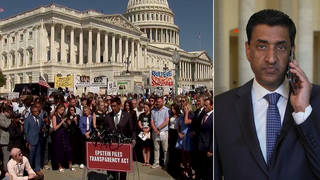
Media Options